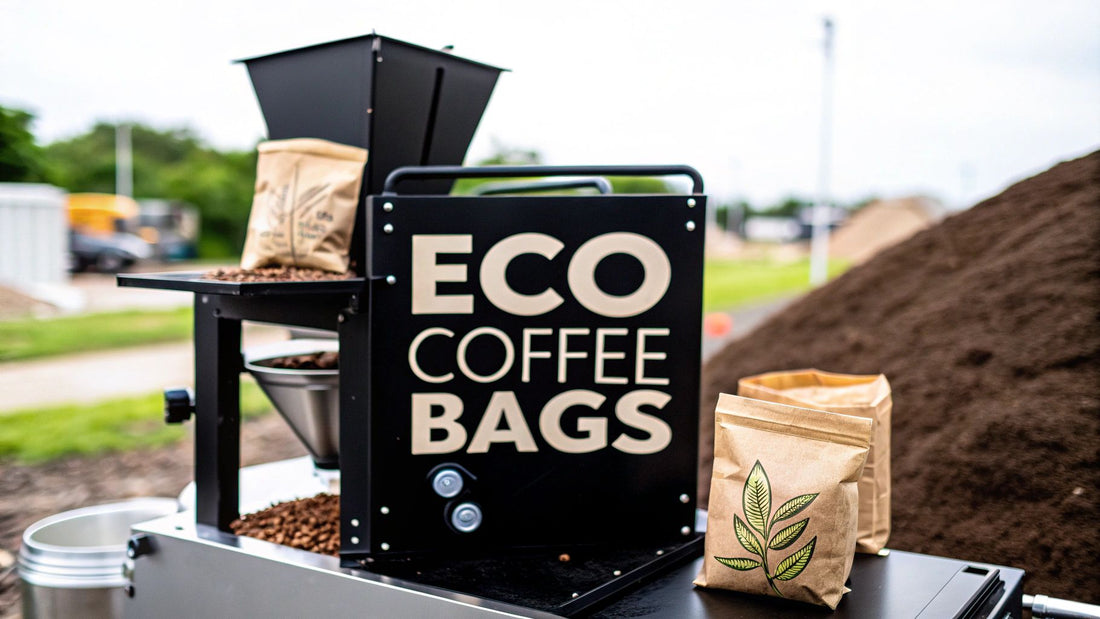
A Guide to Compostable Coffee Bags for the UK Speciality Market
Share
Imagine if your morning coffee ritual could do more than just wake you up. What if it could also help build a healthier planet? This is the new reality brewing in the UK's vibrant speciality coffee scene, where a passion for exceptional beans now goes hand-in-hand with a deep commitment to the packaging they come in. The answer is compostable coffee bags, a forward-thinking choice that tackles packaging waste head-on.
Brewing a Better Future for UK Coffee Lovers
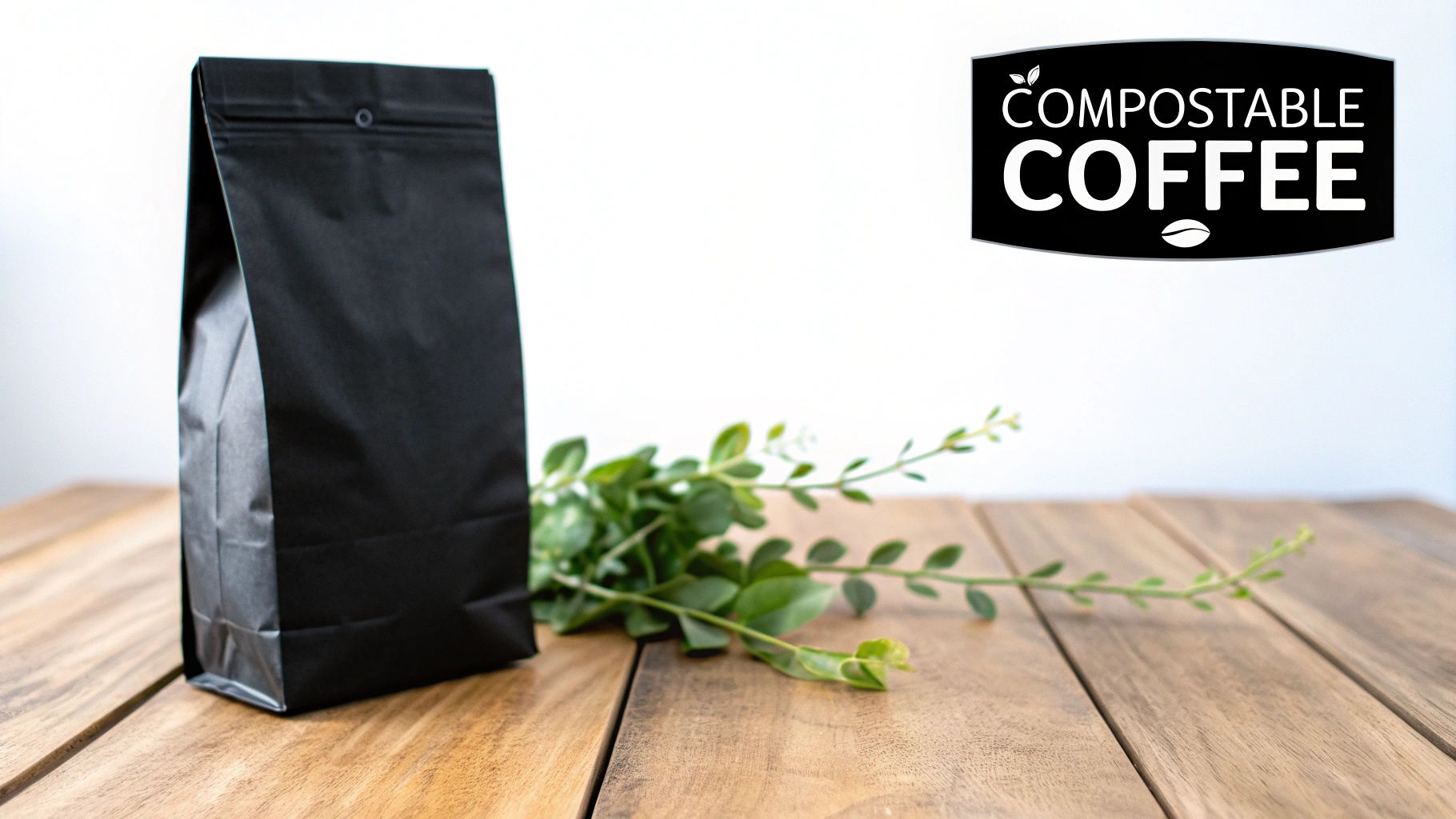
For years, the conversation around speciality coffee in the UK has revolved around flavour profiles, origin stories, and brewing methods. While those elements are still vital, a new chapter is unfolding. Conscious consumers and pioneering roasters are now looking at the entire lifecycle of their coffee, from the farm to the cup and beyond. This has put the spotlight on a huge challenge: the waste created by traditional, non-recyclable packaging.
This is where compostable coffee bags come in, representing an exciting sweet spot where quality meets conscience. They offer a real, tangible way for coffee lovers to align their passion for a perfect brew with a positive environmental impact. It's about more than just keeping another bag out of landfill; it’s about taking part in a circular system where packaging returns to the earth as a nutrient-rich resource.
A Movement Beyond the Beans
Adopting sustainable packaging isn’t just a fleeting trend. It's a movement proving that superior taste and responsible practices can, and should, go together. This shift reflects a broader change in consumer awareness across the UK. As the coffee world evolves, so do our tastes, which is even why some UK consumers are exploring alternatives like matcha. Understanding these wider shifts gives us context for building a genuinely sustainable future for coffee.
By choosing brands that invest in genuinely compostable solutions, you are supporting:
- A reduction in the plastic pollution that plagues our land and oceans.
- The creation of valuable compost to enrich UK soil.
- An industry-wide push toward more mindful production from start to finish.
The ultimate goal is to make sustainable choices the standard, not the exception. When you select coffee in a compostable bag, you're not just buying a product; you're casting a vote for the kind of world you want to live in—one where every element, down to the packaging, is thoughtfully considered. This shift allows your daily coffee to be a small but meaningful act of environmental stewardship.
Understanding Compostable Coffee Packaging
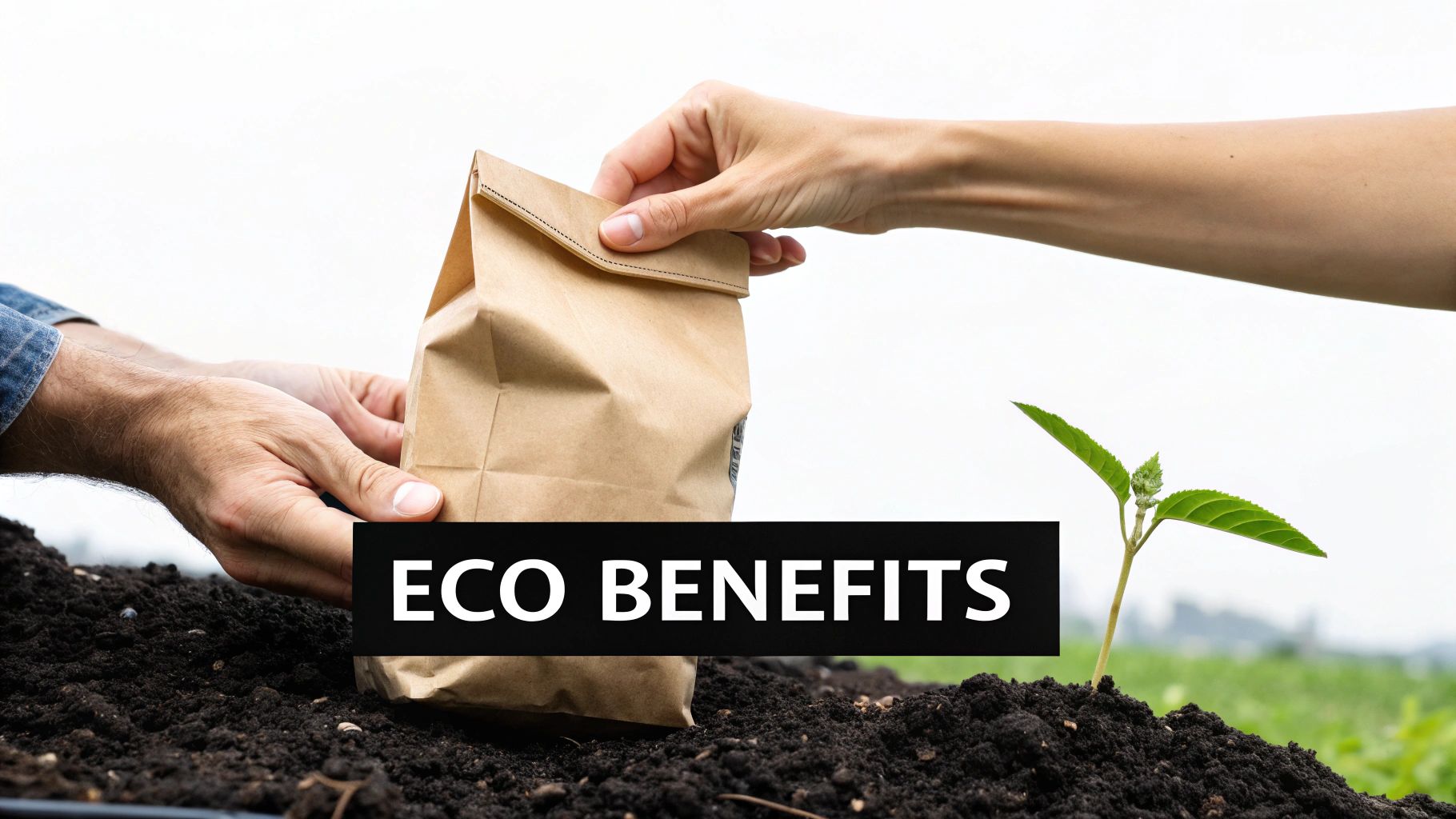
So, how does a coffee bag go from being rubbish to becoming rich plant food? It’s not magic, but brilliant science. Think of it this way: a normal plastic bag in your garden is an unwelcome guest that sticks around for centuries. A compostable coffee bag, on the other hand, is more like an apple core—it’s designed to go back to the earth it came from.
This transformation starts with the materials. These aren’t your typical plastics. They’re made from clever, plant-based sources like Polylactic Acid (PLA), which comes from renewable crops like corn starch or sugarcane. These materials are specifically engineered to break down completely under the right composting conditions, turning into nutrient-rich humus that feeds the soil.
The push for better packaging is a direct result of our love for a great brew. The UK’s coffee market has seen huge growth, which naturally puts a spotlight on the environmental footprint of all that packaging. As more of us brew at home, the demand for sustainable options like compostable coffee bags has soared. These advanced bags are designed to break down in industrial composting facilities, helping to cut down on landfill waste. You can explore more data on coffee market trends and their connection to packaging.
Clearing Up the Confusion
To make good choices, we need to know what the words on the packaging actually mean. Terms like 'compostable', 'biodegradable', and 'recyclable' are often thrown around, but they mean very different things in the UK waste system.
- Recyclable: This means the material (like glass, certain plastics, or paper) can be broken down and remade into new products. It has to be clean and put in the right recycling bin to count.
- Biodegradable: This is a very broad term. It just means the item can be broken down by microbes over time, but it doesn't say how long it will take or what it will leave behind. A log is biodegradable, but it could take decades to disappear.
- Compostable: This is the gold standard for organic breakdown. A certified compostable product is guaranteed to break down into non-toxic, natural elements within a specific timeframe (usually under 12 weeks) in a controlled composting environment, becoming a beneficial soil conditioner.
Understanding these differences is empowering. When you choose a certified compostable coffee bag, you know you’re picking a product designed not just to disappear, but to actively contribute to a healthier, circular system.
Why the Distinction Matters
Choosing a compostable option over a biodegradable one is a deliberate act of sustainability. It’s a commitment to a process with a defined, positive outcome. While a 'biodegradable' claim might feel good, 'compostable' certification gives you the assurance that the packaging will do what it promises—turning what was once waste into a valuable resource for UK soils. This distinction is the key to unlocking the true environmental benefits of your coffee packaging.
How to Spot Genuinely Compostable Bags in the UK
With so many vague environmental claims out there, how can you be sure the packaging you choose actually lives up to its promise? It's easy to get lost in the noise of ‘greenwashing’. This is your field guide to cutting through the confusion and finding genuinely compostable coffee bags in the UK market.
The secret is to look for official seals of approval. These symbols are your guarantee. Think of them less like pictures and more like passports, proving the packaging has passed rigorous, scientific tests relevant to UK and EU standards. They’re your shortcut to trust.
UK Compostability Certifications at a Glance
When you pick up a bag of speciality coffee, your eyes should be searching for specific symbols that confirm its compostable credentials. To help you decode what you see on the shelf, here’s a quick rundown of the main certifications you'll find on coffee packaging in the UK.
| Certification Logo | Governing Standard | What It Guarantees | Composting Environment |
|---|---|---|---|
| ‘Seedling’ Logo | EN 13432 | The packaging will break down in an industrial composting facility. Meets strict criteria for disintegration, biodegradation, and eco-toxicity. | Industrial Only |
| TÜV AUSTRIA ‘OK compost INDUSTRIAL’ | EN 13432 | Verifies the product is fully compostable in an industrial facility and won't harm the final compost. | Industrial Only |
| TÜV AUSTRIA ‘OK compost HOME’ | N/A (TÜV's own standard) | Confirms the packaging is designed to break down in the cooler, variable conditions of a domestic compost bin. | Home & Industrial |
Learning to recognise these logos turns you from a hopeful consumer into an empowered one. You can see past confusing claims and make choices that genuinely support a circular economy.
Industrial vs. Home Composting: What’s the Difference?
So, you’ve found a bag with a compostable logo. Great! But where it can be composted matters. The two most common certifications you'll see are for industrial composting.
These are the ‘Seedling’ logo (EN 13432) and the TÜV AUSTRIA ‘OK compost INDUSTRIAL’ certification. Both promise the bag will disintegrate within 12 weeks and biodegrade by at least 90% within six months in a proper facility. It’s a promise that the packaging will return to the earth as healthy soil.
As consumer awareness grows, it's vital for UK roasters to stay informed on the latest sustainable labelling best practices, especially as UK rules continue to evolve.
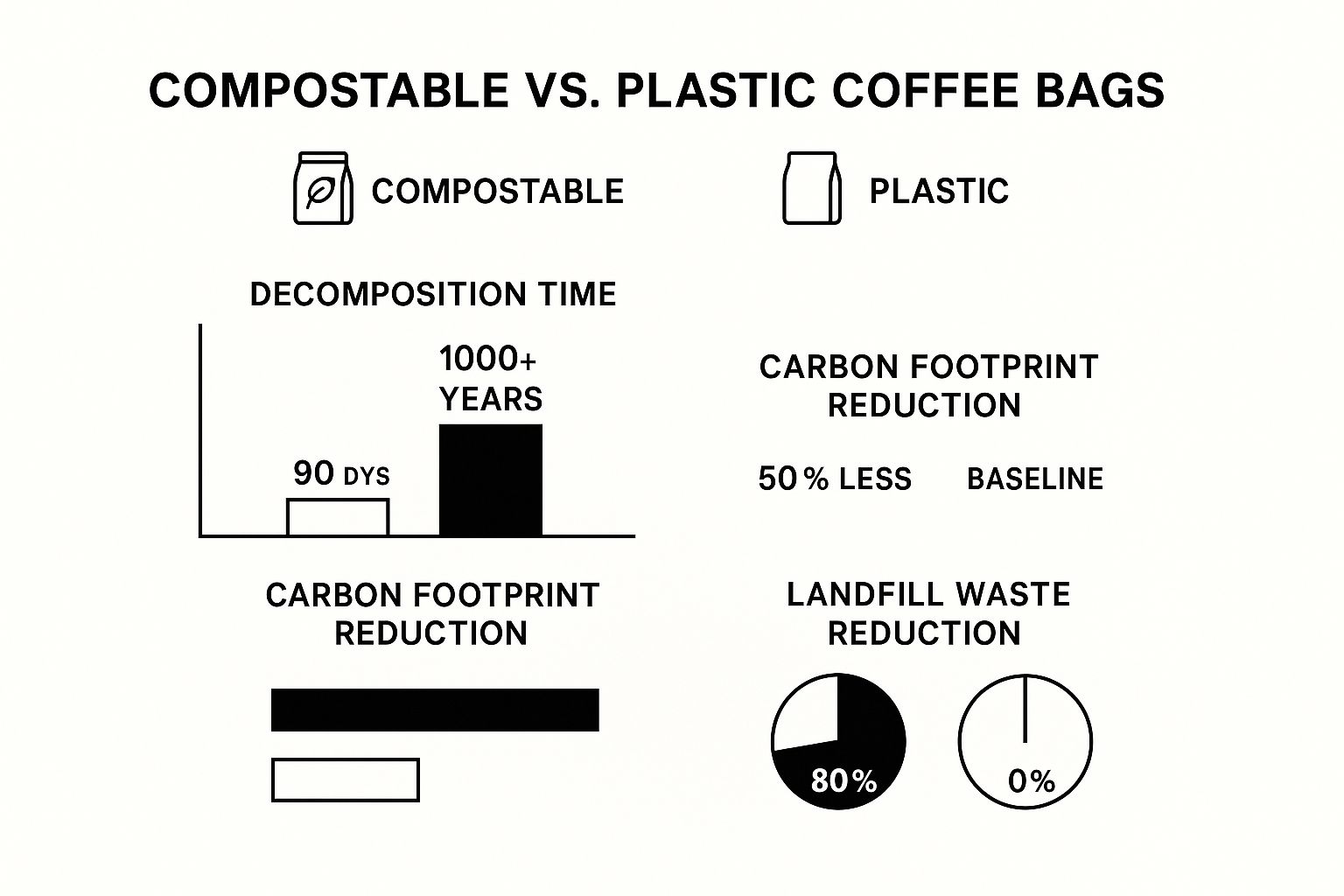
The data here is clear. Choosing certified compostable bags isn't just a small gesture—it's a massive step toward reducing long-term waste and lowering your carbon footprint.
For the Home Composter
But what if you want to compost your packaging right in your own garden? This is where things get a bit more specific. Garden compost heaps just don't reach the high, consistent temperatures of industrial facilities.
For this, you need to look for a different, equally important certification:
The TÜV AUSTRIA ‘OK compost HOME’ logo is your assurance that the packaging is designed to break down in the cooler, variable conditions of a domestic compost bin.
Without this specific seal, a bag simply labelled 'compostable' will likely just sit in your garden compost without breaking down properly.
By learning these simple logos, you can be certain that every bag of coffee you buy is a true investment in both exceptional flavour and a sustainable future. Your choice is helping to create a positive impact, one brew at a time.
The Journey of a Coffee Bag From Your Kitchen to the Earth
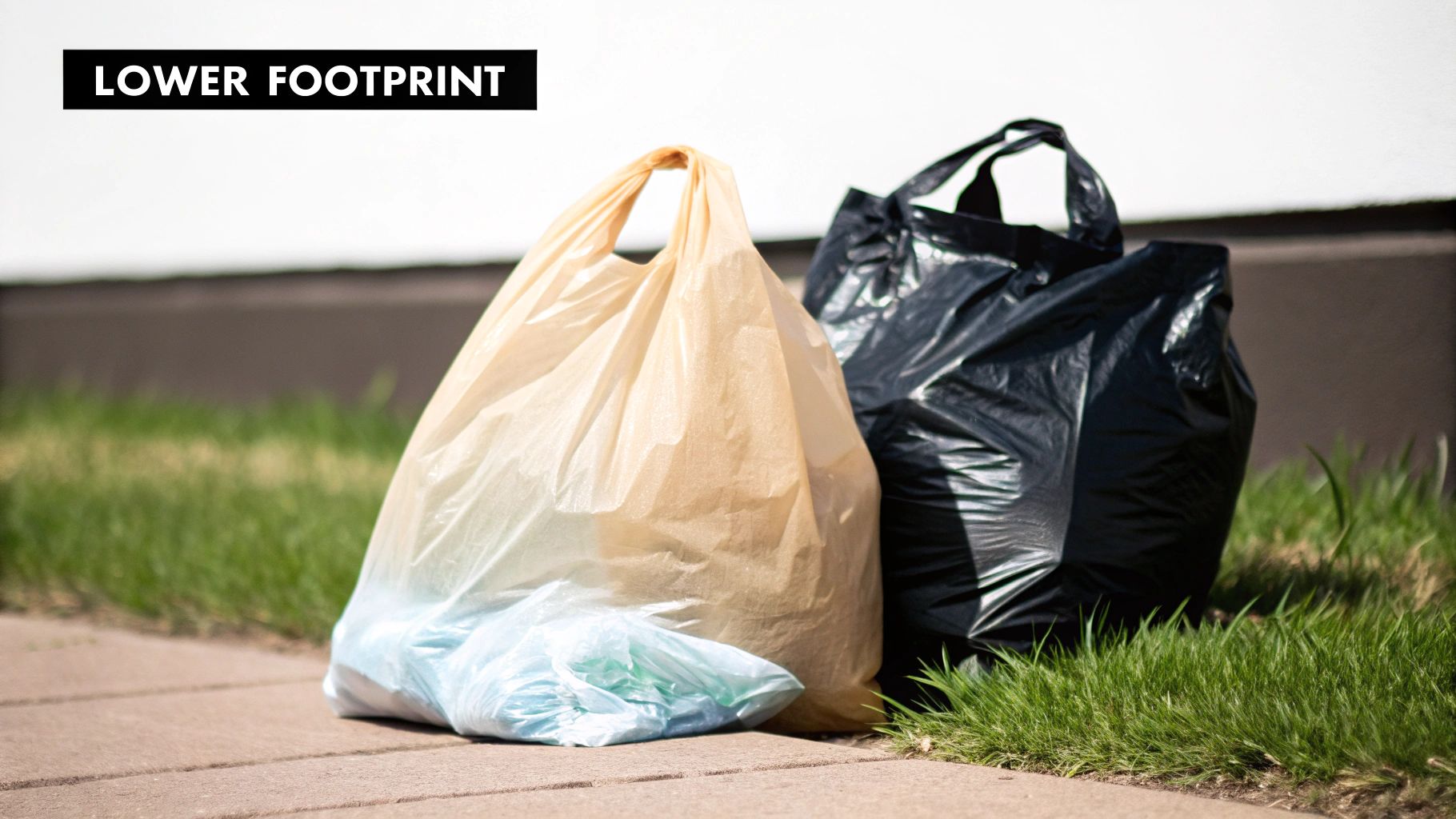
So, what happens after you’ve brewed that last, perfect cup of coffee? This is where your sustainable choice truly begins to shine, starting the final—and most important—part of its lifecycle. The journey of a compostable coffee bag from your kitchen counter back to the earth is a fantastic example of a circular economy in action, turning would-be waste into a precious resource.
For most of us in the UK, the main route for these clever bags is industrial composting, usually handled by your local council’s food waste collection. This is where your empty coffee bag joins food scraps, peelings, and other organic bits and bobs on its way to a specialised facility.
This kind of consumer-led change is making a real difference. The UK's compostable packaging market has seen significant growth, fuelled by government targets to slash plastic waste and a growing public appetite for packaging that returns to the soil instead of sitting in a landfill.
The Industrial Composting Pathway
At an industrial composting facility, the conditions are fine-tuned to give nature a serious speed boost. The mix of organic waste is shredded and piled into large tunnels where temperatures soar to a toasty 55-65°C. This intense heat, combined with carefully managed oxygen and moisture levels, creates the perfect five-star resort for microorganisms to get to work breaking down your coffee bag and everything else.
In just a few months, what was once your coffee packaging has been transformed into a dark, nutrient-rich compost. This valuable stuff is then used in agriculture, horticulture, and landscaping all over the UK to improve soil health, cut down on the need for chemical fertilisers, and help grow our food.
To make sure your bag completes its journey, just follow these steps:
- Check Your Council's Rules: This is the most important part. Pop onto your local council’s website and search for "food waste collections" to see if they accept certified compostable packaging. Rules can vary from one area to another, so always check first.
- Use the Right Bin: If your council gives the green light, simply toss the empty bag straight into your food waste caddy.
- Keep Contaminants Out: Never, ever put compostable bags in your dry recycling bin. They are designed for the organic waste stream and will only contaminate the recycling process if they end up in the wrong place.
The Home Composting Route
For those with a green thumb and a bit of garden space, home composting is another brilliant option. It does, however, require a specific type of packaging. As we’ve mentioned, you need to look for the ‘OK compost HOME’ certification. These bags are engineered to break down in the cooler, more variable conditions of a typical garden compost heap.
Creating a thriving compost pile is a deeply rewarding experience. It’s all about building a balanced little ecosystem right in your own back garden. To get it right, you need a healthy mix of "greens" (nitrogen-rich materials like grass clippings and kitchen scraps) and "browns" (carbon-rich materials like cardboard, twigs, and your home-compostable coffee bag).
Once your compostable coffee bags have fully broken down, the resulting compost is a fantastic, all-natural food for your garden. Learn more about using compost as organic vegetable fertilizer to really make the most of this "black gold." By taking these simple steps, you empower your packaging to fulfil its destiny, closing the loop and turning waste back into a vital resource for the planet.
Preserving Peak Freshness in Sustainable Packaging
For any speciality coffee lover in the UK, one question always comes up when we talk about new packaging: will it protect the beans? It’s a fair question. The fear that an eco-friendly choice might force a compromise on flavour is completely understandable. But the great news is that you no longer have to choose between sustainability and quality.
Today's best compostable coffee bags are marvels of material science. They've been specifically engineered to be true guardians of your coffee's complex and delicate character. It's a common myth that "plant-based" means flimsy or ineffective. In reality, these bags are built to be robust protectors.
This dual focus on freshness and sustainability is driving huge growth in the UK coffee bag market. The demand for speciality coffee packaging is surging as roasters seek advanced compostable solutions that expertly lock in freshness while cutting down on plastic waste to meet new environmental standards. You can read more about these market projections and packaging innovations here.
The Science of Sealing in Flavour
So, how do these bags actually work their magic? It all comes down to creating a fortress against coffee's three greatest enemies: oxygen, moisture, and light. Each one of these can rapidly destroy the volatile aromatic compounds that make your coffee special, leaving you with a dull, stale brew.
Modern compostable bags fight this with a clever, multi-layered construction. Don't think of it as a single sheet of material, but as a carefully built shield.
- High-Barrier Layers: The inner layers are typically made from plant-based polymers like PLA. They are designed to be almost impermeable to oxygen, stopping the oxidisation process that makes coffee taste flat.
- Protection from Moisture: That same barrier also keeps out humidity, which can give beans a musty taste and speed up staling.
- Light-Blocking Design: The outer layers, often made from kraft paper, provide a crucial defence against UV light, which breaks down the delicate oils and aromatics in roasted coffee.
The Essential Degassing Valve
Freshly roasted coffee beans release a lot of carbon dioxide for several days after roasting. This process, known as degassing, is a fantastic sign of freshness. The problem is, if that gas gets trapped in a sealed bag, it can cause the package to swell up and even burst.
This is where the one-way degassing valve becomes so important.
For years, the valve was a huge roadblock to creating fully compostable packaging because it was almost always made from traditional plastic. Today, pioneering UK roasters use bags fitted with fully compostable one-way valves, often made from the same PLA bioplastic as the bag's liner.
This small but mighty component lets CO₂ escape without allowing any damaging oxygen to get in. It’s the final, critical piece of the puzzle that makes sure your coffee stays at its absolute peak, from the roastery all the way to your grinder.
By investing in this advanced packaging, the UK's top speciality coffee roasters are making a powerful statement. It shows a total commitment to excellence that goes beyond just sourcing incredible beans. It's a dedication to preserving that quality through every step, ensuring the final cup you brew at home is as vibrant and flavourful as it was meant to be. This is how compostable coffee bags become a symbol of both environmental responsibility and an unwavering passion for the perfect brew.
Your Questions About Compostable Coffee Bags, Answered
As the move towards truly sustainable coffee picks up steam, it's only natural to have questions. After all, making an informed choice is the most powerful tool you have. We've put together this section to tackle the most common queries we hear, clearing up any confusion with straightforward, practical answers for the UK coffee lover.
Our goal is simple: to give you total confidence on your sustainable coffee journey. By getting these questions out of the way, we can move past the myths and focus on the real, positive impact of choosing genuinely compostable packaging.
Can I Put Compostable Coffee Bags in My Recycling Bin?
This is one of the most common questions, and the answer is a simple but firm no. It’s crucial to understand that compostable materials are worlds away from recyclable plastics, paper, or glass. They are designed to break down into organic matter, not to be melted down and reformed into new products.
Tossing compostable packaging into your household recycling contaminates the entire batch. Think of it like adding an apple core to your paper recycling—it just ruins the quality of the materials. This contamination can be so severe that it forces waste management facilities to send an entire lorry-load of otherwise clean recycling straight to landfill.
The only correct place for certified compostable coffee bags is the organic waste stream. This means your food waste caddy for industrial composting, or a well-managed home compost bin if the packaging is certified for it. Always keep them separate from your recycling.
What Is the Real Difference Between Biodegradable and Compostable?
This is a key distinction that helps cut through a lot of marketing noise. While the terms sound similar, their meanings couldn't be more different, especially when you're looking for verified environmental benefits.
'Biodegradable' is a very broad and often vague term. Pretty much everything is biodegradable if you give it enough time—a fallen tree is biodegradable, but it might take a century to fully decompose. The term carries no official guarantee about how long the process will take or what, if anything, it might leave behind.
'Compostable', on the other hand, is a precise, scientific standard. For a bag to be certified compostable in the UK (under the EN 13432 standard), it has to pass strict tests:
- Disintegration: It must break down into small pieces within 12 weeks in an industrial composter.
- Biodegradation: At least 90% of the material must turn into water, CO₂, and biomass within six months.
- Non-Toxicity: The final compost must be free of harmful toxins and completely safe for growing plants.
In short, 'biodegradable' is a claim, while 'compostable' is a certified promise. Always look for the official logos like the 'Seedling' or 'OK compost' marks. That’s how you know you’re choosing a product with proven, positive end-of-life credentials.
Should I Remove the Valve and Zipper Before Composting?
This is an excellent, practical question. For a long time, the degassing valve and resealable zipper were the final hurdles in creating a fully compostable bag. Thankfully, material science has made incredible strides.
In most modern, high-quality compostable coffee bags, these components are now also made from certified compostable bioplastics like PLA. A good roaster will usually state this clearly on the packaging or their website. If the entire bag is certified as fully compostable, you can typically pop the whole thing into your food waste bin.
However, if you're ever in doubt or the packaging isn't clear, it’s always best to play it safe. If the valve or zipper look and feel like traditional plastic, just snip them off with scissors and put them in your general waste bin before composting the rest of the bag. This simple step ensures the composting process stays pure and effective.
Why Doesn't My Local UK Council Accept Compostable Packaging?
This can be one of the most frustrating parts of trying to do the right thing. The honest answer is that the UK's organic waste processing infrastructure is a real patchwork, with different rules and capabilities from one council to the next.
There are a few reasons why your local council might not yet accept compostable packaging in their food waste collections:
- Facility Equipment: Some older industrial composting facilities (known as In-Vessel Composting or IVCs) might not be set up to handle the specific breakdown requirements of bioplastics.
- Contamination Worries: A huge issue for councils is contamination from non-compostable lookalikes. It can be tough for staff to tell a genuine compostable bag from a conventional plastic one, which can mess up the whole composting process.
- Processing Times: While certified packaging is designed to break down within a set timeframe, some councils run their composting cycles on a tighter schedule and worry the materials won't fully decompose in time.
The best first step is always to check your local council’s website for their current food waste rules. The good news is that as consumer demand grows and government initiatives push for better circular systems, more councils are investing in and updating their facilities. So, if your area isn't on board yet, don't lose heart—it's worth checking back, as the situation is always improving.
At Ue Coffee Roasters, we believe that exceptional coffee and a commitment to the planet go hand in hand. Our dedication to quality extends from sourcing the finest speciality beans to selecting packaging that honours that quality while protecting our environment. Explore our range of incredible coffees and join us on a journey to a more sustainable and flavourful future.
